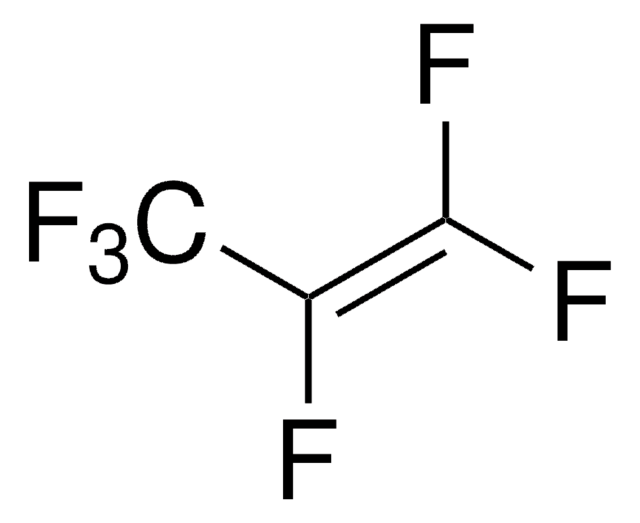374334
1,1,1,2-Tetrafluoroethane
≥99%
Synonym(s):
HFC-134a
Sign Into View Organizational & Contract Pricing
All Photos(1)
About This Item
Linear Formula:
FCH2CF3
CAS Number:
Molecular Weight:
102.03
EC Number:
MDL number:
UNSPSC Code:
12142100
PubChem Substance ID:
NACRES:
NA.22
Recommended Products
Assay
≥99%
bp
−26.5 °C (lit.)
SMILES string
FCC(F)(F)F
InChI
1S/C2H2F4/c3-1-2(4,5)6/h1H2
InChI key
LVGUZGTVOIAKKC-UHFFFAOYSA-N
Looking for similar products? Visit Product Comparison Guide
General description
1,1,1,2-Tetrafluoroethane is used as a trifluorovinylating agent in organic synthesis. It is identified as a potential refrigerant used in place of chlorofluorocarbons. 1,1,1,2-Tetrafluoroethane can also be used as a solvent and medical propellant for a wide range of applications. It is used to extract materials of natural origin like natural flavors, fragrances, and nutraceuticals.
Application
1,1,1,2-Tetrafluoroethane can be used:
- As a solvent in the preparation of cross-linked polymer microspheres through the dispersion polymerization method.
- As a porogenic solvent in the preparation of porous polymethacrylate monolith via free radical polymerization.
- In the synthesis of trifluorovinyllithium, a key intermediate for the preparation of 2-halo-2,3-dideoxy-arabinose derivatives of biological importance.
Packaging
Supplied in a Sure/Pac™ cylinder and has a brass needle valve with a male 1/4" NPTF outlet thread installed. Before using the cylinder, ensure that the valve is closed, then remove the galvanized steel hex cap that seals the outlet valve.
Compatible with the following:
Compatible with the following:
Legal Information
Aldrich is a registered trademark of Sigma-Aldrich Co. LLC
Sure/Pac is a trademark of Sigma-Aldrich Co. LLC
also commonly purchased with this product
Product No.
Description
Pricing
hose barb
Product No.
Description
Pricing
recommended
Product No.
Description
Pricing
regulator
Product No.
Description
Pricing
Signal Word
Warning
Hazard Statements
Precautionary Statements
Hazard Classifications
Press. Gas Compr. Gas
Storage Class Code
2A - Gases
WGK
WGK 1
Flash Point(F)
Not applicable
Flash Point(C)
Not applicable
Certificates of Analysis (COA)
Search for Certificates of Analysis (COA) by entering the products Lot/Batch Number. Lot and Batch Numbers can be found on a product’s label following the words ‘Lot’ or ‘Batch’.
Already Own This Product?
Find documentation for the products that you have recently purchased in the Document Library.
Customers Also Viewed
Yang Chen et al.
Pharmaceutical research, 32(9), 2928-2936 (2015-03-20)
This study investigated the effect of different active pharmaceutical ingredients (API) on aerosol electrostatic charges and aerosol performances for pressurized metered dose inhalers (pMDIs), using both insulating and conducting actuators. Five solution-based pMDIs containing different API ingredients including: beclomethasone dipropionate
Lena Ernstgård et al.
Journal of applied toxicology : JAT, 30(1), 59-62 (2009-08-25)
Blood-air and tissue-blood coefficients (lambda) are essential to characterize the uptake and disposition of volatile substances, e.g. by physiologically based pharmacokinetic (PBPK) modelling. Highly volatile chemicals, including many hydrofluorocarbons (HFC) have low solubility in liquid media. These characteristics pose challenges
Yang Chen et al.
AAPS PharmSciTech, 18(3), 782-789 (2016-06-19)
The aim of this study is to investigate aerosol plume geometries of pressurised metered dose inhalers (pMDIs) using a high-speed laser image system with different actuator nozzle materials and designs. Actuators made from aluminium, PET and PTFE were manufactured with
Daniel Moraga-Espinoza et al.
International journal of pharmaceutics, 543(1-2), 376-385 (2018-04-11)
High-speed laser imaging (HSLI) is the preferred technique to characterize the geometry of the plume in pressurized metered dose inhalers (pMDIs). However, current methods do not allow for simulation of inhalation airflow and do not use drug mass quantification to
1, 1, 1, 2-Tetrafluoroethane; from refrigerant and propellant to solvent
Corr S
Journal of Fluorine Chemistry, 118(1-2), 55-67 (2002)
Our team of scientists has experience in all areas of research including Life Science, Material Science, Chemical Synthesis, Chromatography, Analytical and many others.
Contact Technical Service










